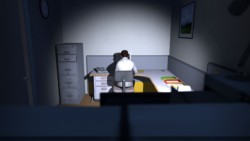Why do gamers find control and monotony so addictive?
I’ve lost count of the amount of times my mum saw one of my Sims doing their homework, or saw me organising my house in Fallout meticulously. She’d always ask if I had fun doing it in a game, why didn’t I enjoy it in real life. The best answer I can come up with is control. Control is something that can be pretty tough to find in real life, but when you interact with a world built on very specific rules and commands, you can essentially become a god.
In the Sims you can control everything about your little creations and their lives. Want them to get married? Easy: just press ‘flirt’ a bunch of times and before you know it you’re well on the way to a proposal. Real life flirting, unfortunately, is not as simple. There are no scripts or algorithms to automatically follow. In real life there’s risk and uncertainty in everything you do, that can leave you feeling like you aren’t really in control of anything.

Image Credit: Galatic Cafe/Galactic Cafe
The Stanley Parable explores this concept quite nicely. You awaken in an office and can either follow the instructions given to you by an unseen narrator, or ignore them completely and wander and daydream to your heart’s content. Arguably the most boring ending for the game comes from following all the instructions. You do as you’re told, you play it safe and in the end you get rewarded with very little. If you take matters into your own hands, however, you hear the great dialogue of an irritated narrator and find way more areas and details in the game. In real life, if your boss tells you to do something and you stare at him unflinchingly for 5 solid minutes, you’ll probably get sacked, or at the very least avoided for the rest of the week (so maybe not such a bad idea if you want some peace at work).
Real life may not have the risk of dragon attacks, but somehow the decisions we make feel less like our own than they do in games. There’s no instant satisfaction, no immediate reward. We can’t fast forward work or cooking or lower the difficulty when we’re struggling with an essay, or when a dragon shows up out of nowhere for the millionth damn time and kills that character I was just about to finish a quest for!!! Never mind… just reload that last auto save.
We live in a world where we have very little control, so that’s why I’m doing my Sims homework and not my own pile of slowly mounting essays, because I choose control over uncertainty.
Decisions we make in reality are often final. We can’t look at a wiki to find out all the possible outcomes, or reload if something doesn’t go our way. We live in a world where we have very little control, so that’s why I’m doing my Sims homework and not my own pile of slowly mounting essays, because I choose control over uncertainty.
Obviously the risk and uncertainty of real life is what makes it so interesting and rewarding, but every now and again it’s much nicer to just have everything you want available to you through a few clicks. It isn’t realistic or sustainable, but that’s why games are sometimes used as a brief escape from reality. A few hours of total control among a lifetime of uncertainty.

Comments